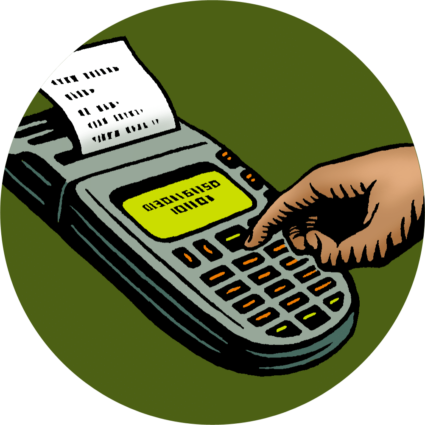Using Your Point-of-Sale Device

- Does a POS device accept credit, debit, and SNAP EBT cards? Should I get an EBT-only device?
- Do I need to provide a paper transaction receipt to SNAP customers?
- Who is liable (legally responsible) for the market’s operation of a SNAP POS device?
- If my market changes owners, responsible officials, or locations, do I need to report this information to FNS?
- Can I use manual vouchers if my POS equipment won't work?
-
Does a POS device accept credit, debit, and SNAP EBT cards? Should I get an EBT-only device?
Farmers markets and direct marketing farmers may choose to obtain an EBT-only POS device or a POS device that accepts SNAP EBT, credit, and debit cards.
There are three primary differences between these POS devices: cost, opportunity for sales, and stigma reduction.
Cost. Historically, many state agencies have provided funding for SNAP-only POS devices, not devices also capable of accepting debit and credit cards. For a state-by-state SNAP EBT resource list, click here. Currently, however, farmers markets and direct marketing farmers can apply to MarketLink for a free POS device that processes EBT, credit, and debit cards. Check with MarketLink or your state or regional association to determine if you are eligible or if there are other programs that can cover the costs of obtaining and operating a POS device. For more on the costs of SNAP equipment, click here.
Sales. In terms of opportunities for sales, having a POS device that accepts all three forms of payment (EBT, debit, and credit) allows customers to use a wider array of payment methods. Offering these options has the potential to increase sales, by giving customers who don’t carry cash an easy way to make a purchase without running to an ATM. Notably, markets using a centralized POS device may create and implement a market currency or receipt system to allow customers without cash to make purchases from vendors without their own POS devices.
Stigma reduction. In markets where only SNAP customers use market currency or receipts, or at SNAP-authorized vendors with EBT-only POS devices, SNAP transactions are uniquely visible. This may make SNAP customers feel stigmatized as their transactions stand out from those of other shoppers. In markets where any EBT, debit, or credit card holder can purchase tokens/paper scrip, or at direct marketing farmer-vendors with POS devices that accept EBT, debit, and credit cards alike, less attention is drawn to SNAP customers.
For some markets, nearby ATMs are appreciated because fewer debit transactions at the market mean fewer tokens to count. However, markets also may lose the debit transaction surcharge for debit/credit tokens, which pays for POS transaction expenses and associated monthly fees.
If a market wants their customers to buy debit/credit tokens, they can encourage shoppers to use market tokens by displaying signs that state: “The surcharge supports our farmers market SNAP program so our low income neighbors can buy farm fresh produce.”
Back to questions
-
Do I need to provide a paper transaction receipt to SNAP customers?
Yes. Under SNAP rules, farmers markets and direct marketing farmers are required to provide a paper receipt to their SNAP customers. However, FNS has authorized some third-party processors to allow their customers to provide receipts via email or text message. Ask your third-party processor about your options.
Back to questions
-
Who is liable (legally responsible) for the market’s operation of a SNAP POS device?
For markets with a market-operated SNAP system, the market and its “responsible official(s)” are liable for the market’s (including vendors’) compliance with SNAP rules. To learn more about “responsible officials,” click here.
Therefore, if market personnel misuse the device or vendors violate SNAP rules (say, by selling SNAP-ineligible goods), the entire market can be penalized. For more on potential penalties, click here.
Back to questions
-
If my market changes owners, responsible officials, or locations, do I need to report this information to FNS?
Yes. Farmers markets are required to report changes in ownership to FNS. These changes will generally require the market to fill out a new SNAP-authorization application.
Farmers markets also need to report changes in responsible official(s) to FNS. For responsible official changes, FNS will determine on a case-by-case basis whether the market needs to complete a new application or whether FNS can simply update the market’s existing authorization.
Finally, farmers markets need to report location changes to FNS. As with responsible official changes, FNS determines on a case-by-case basis whether these changes require the market to undertake a new application, or whether FNS can simply update the market’s existing authorization.
Back to questions
-
Can I use manual vouchers if my POS equipment won't work?
There is uncertainty about manual vouchers. If your market is in a location where a POS device doesn't work, you may be able to use manual vouchers. Ask your EBT processor how to get manual vouchers. To read more about manual vouchers, click here.
Back to questions
